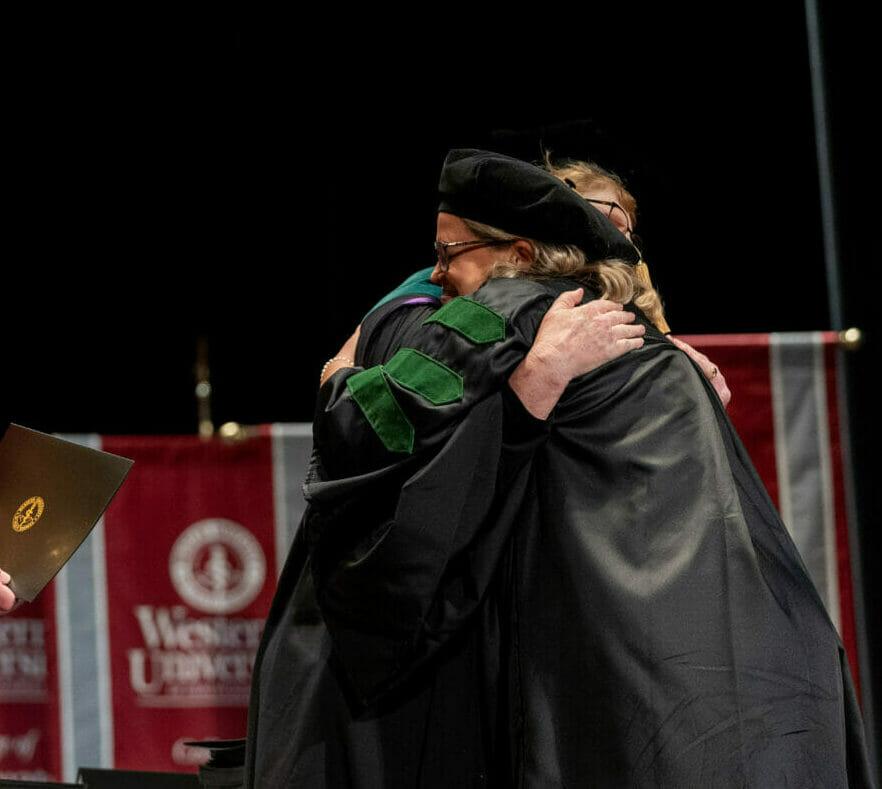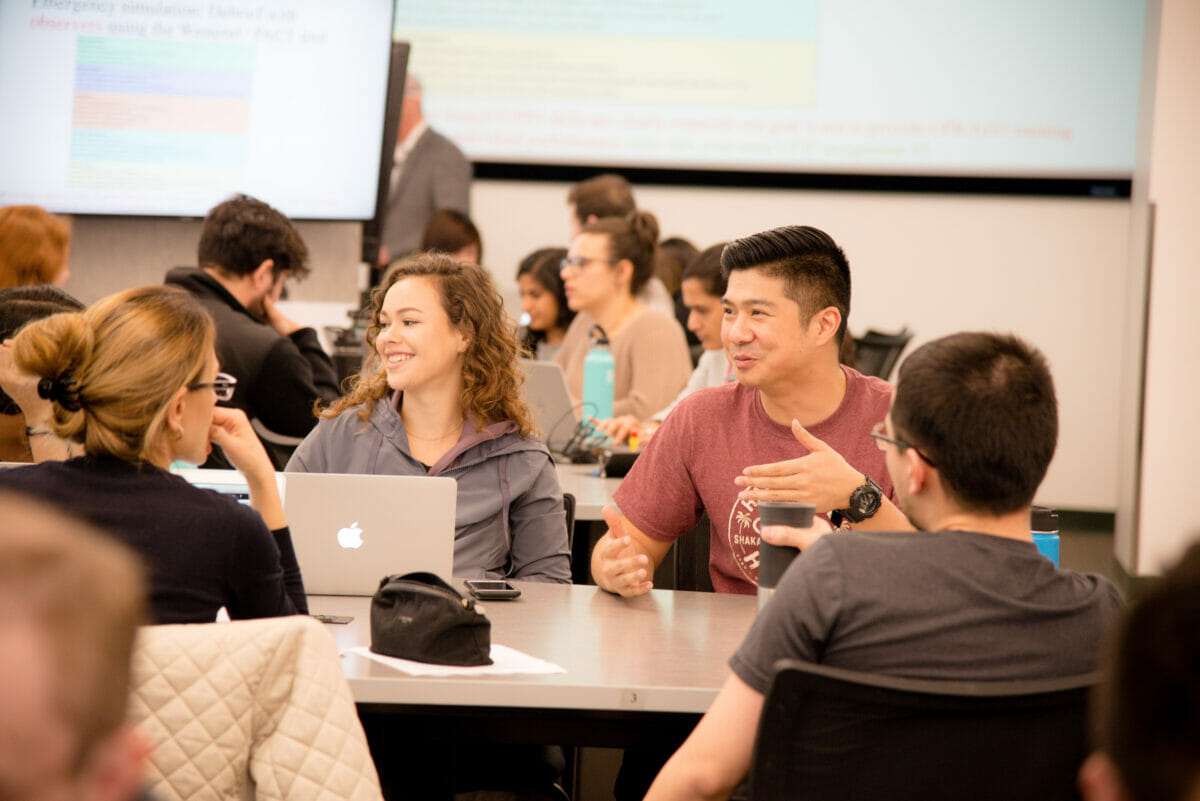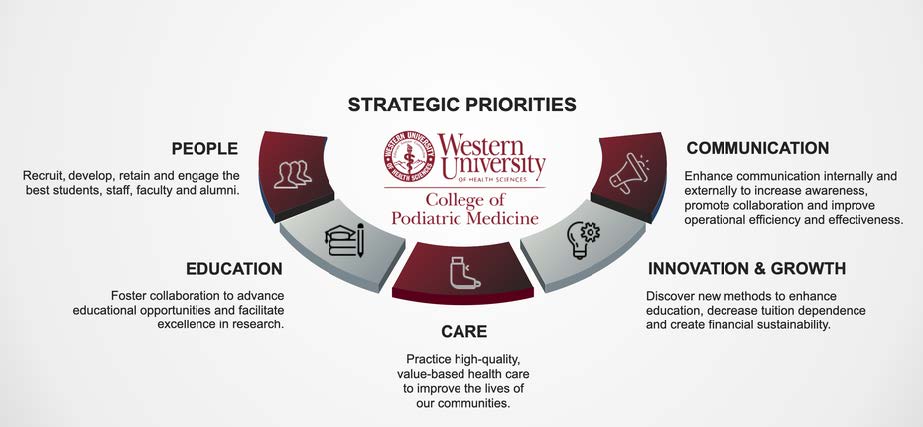
About the College
Western University of Health Sciences College of Podiatric Medicine’s progressive and comprehensive medical education is leading the way in inspiring and preparing a new generation of podiatric physicians of the lower extremity whose expertise and compassionate care for the whole person improves lives.

MAKE CONNECTIONS, LIFELONG RELATIONSHIPS
MISSION
The mission of Western University of Health Sciences College of Podiatric Medicine is to mentor and educate students by providing innovative educational experiences, including interprofessional patient care, in an inclusive, diverse and equitable environment, and inspiring a passion to improve the lives of others.
VISION
To be the global leader of innovative and integrated Podiatric Medical Education.
CORE VALUES
Embody a humanistic tradition that encompasses compassion, humility, integrity, truth, quality, and service.

Interprofessional Education
CPM helps you to become a whole-body physician specializing in lower extremity medicine and surgery.
Early Hands-On Experiences
- Over 40 standardized patient experiences starting in fall of Year One
- Community outreach through service-learning opportunities like Special Olympics and student-run clinics
- Busy urban and suburban clinics
Real Research Opportunities
- Extremitas peer-review student journal
- Paid summer research fellowships
- Assistance to attend conferences to present work
- Proven track record of student research presented at national conferences
Student-Focused Learning
- Interprofessional education with 8 health care colleges
- A remediation program that keeps students with their class for better on-time graduation rates
- Paid subscriptions to board prep programs and online learning communities
- Protected time for board prep
- Free wellness and accommodative supportive services
- Individualized student mentorship
- Digital Doctor’s Bag® – an iPad with pre-installed apps to assist you with learning
- 3-D Anatomy apps that allow virtual dissection
- Mock residency interviews, case conferences and journal club to help students to prepare for audition rotations
- A special University department dedicated to offering help in learning skills, providing tutors and wellness strategies
State-of-the -Art Facilities
- New biomechanics lab with latest motion capture technology, orthotic production and traditional methods
- Simulation labs with powered surgical equipment and sawbones for performing procedures
- Virtual reality operating room experience
- Computerized case simulations for reinforcement of skills
Beautiful Suburban Campus in Southern California
- Year-round outdoor learning & playing spaces with WIFI enabled connectivity
- 45 minutes to the beaches or to the ski slopes
- Many housing opportunities both on campus and within blocks of campus
The Most Rotation Months Possible
- Up to 7 audition rotation months BEFORE residency interviews to optimize face-time with program directors
- Southern California hospital rotations in year 3
- National rotations in year four
Global Impact
- Diabetic foot fellowships in India, expanding to the world
- Opportunity to interact with physicians around the world
- Global telemedicine experiences
World Class Faculty
- Most faculty double boarded in medicine and surgery
- Respected leaders in state and national organizations
Core Competencies
- Academic excellence
- Innovative training practices
- Interprofessional education
- Compassion as health care providers
- Health care team integration
Additionally, the College aspires to excellence in producing students in:
- Medical knowledge
- Podiatric medical knowledge
- Patient-focused quality care
- Professionalism (Leadership)
- Research
- Interprofessional and Communication Skills
- Evidence-based learning
- Systems-based practice
- Lifelong learning
The goal of CPM’s curriculum is to prepare every CPM student with the knowledge, attitudes, and skills to excel in postgraduate podiatric medicine and surgery residency training programs of their choice. Specifically, the student will develop the expected competencies to enable them to demonstrate:
- Knowledge of pre-clinical science (application of didactic knowledge to clinical setting)
- Prevention, recognition, diagnosis and management of systemic diseases and local disorders that adversely affect the foot, ankle, and lower extremity (LE), foot and ankle as seen in a podiatric medical practice
- Development of professional ability to work with others, reflecting cultural competence, ethical behavior, humanistic behavior, compassion and concern for others
- Demonstration of the ability to function as a member of an inter-professional team
- Demonstration of the ability to understand research methodology and other scholarly activities
- Demonstration of the ability to understand podiatric medical practice and delivery of care in the various health-delivery settings (private practice, hospital-based practice, and health care educational systems such as college and academic health science centers, free standing colleges of podiatric medicine, health maintenance organizations group practices and inter-disciplinary practice settings)
- Demonstrate practice habits and management techniques for quality patient care in a variety of communities, health care settings, and living arrangements
- Pre-clinical science knowledge
- Prevention, diagnosis, and management of diseases and disorders of the LE In a cost-effect manner


